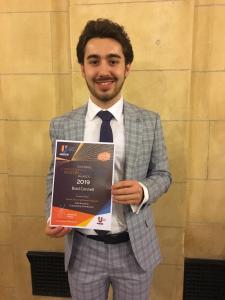On 12.02.2019, Bangor Zoological Society welcomed Rob Taylor QPM from North Wales Police rural crime team.
Rob covered a range of wildlife related offences from organised badger baiting to poaching.
Badger baiting
A distressing topic I was unaware off, badger baiting involves retrieving badgers from setts and using them to train fighting dogs.
Rob explains how small breeds of dogs, usually stolen, are sent down holes to keep the badgers at bay whilst criminal’s dig down to retrieve it. Meanwhile, the trapped badger claws at the dog who often suffers gruesome injuries to the lower jaw.
Once badgers are captured, their claws and teeth are horrifically removed so they don’t cause any real harm to the fighting dog; their only defence is their strength.
Raptor persecution
Rob shows pictures of raptors commonly killed, such as hen harriers and golden eagles. He shows pictures illustrating a common method used to poison these birds.
This involves tying a pigeon to a rock and placing poison on its back. The helpless pigeon is preyed upon by the raptor who unfortunately succumbs to the poison.
Worryingly, the poison used is extremely harmful to other wildlife, pets and children who may come across the deceased bird.
Collections
Rob told the audience of cases where he’d been called to houses suspected of possessing collections of endangered, protected species and animal products.

One case involved a man in possession of hundreds of eggs belonging to endangered species. Another case involved the collection of endangered taxidermic species, including the Scottish wildcat – a protected species extremely rare in Scotland.
I asked Rob what the police do with these collections. He explains that some are taken, with permission from the courts, and used for education on road shows or in schools.
Identifying crime
During the Q&A, Rob was asked what tips he would give people to identify crimes. For badger baiting, he told us to be aware of people wandering around common badger sites with small breeds of dogs and large hunting dogs.
Rob says an easy way to identify a raptor poisoning is dead flies on the body due to the effects of the poison.
My Thoughts
I found this talk extremely educational in learning what is unfortunately happening to some of our local wildlife. Although some pictures were distressing, it’s important to include them in a talk such as this as it gives you a realisation that the stories being told have actually occurred; they’re not just words out of someone’s mouth.
It was frustrating hearing about certain crimes, such as shooting cattle with crossbows. It left me wondering why people feel the need to commit petty crimes and harm defenceless animals.
I have toyed with the idea of joining the police force but always see my career more involved with animals. However, the rural crimes unit wasn’t something I was aware of. It’s something I find interesting and although there must be distressing times, I imagine it can be very rewarding.
Read more on wildlife crime: https://www.worldanimalprotection.org.uk/campaigns/animals-wild/wildlife-crime-in-uk
Follow the Rural crime team @NWPRuralCrime

